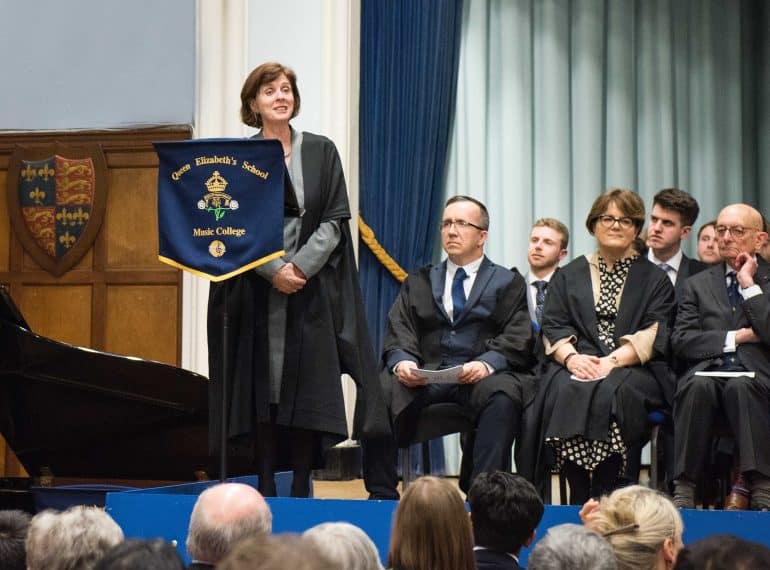
QE’s high-achieving pupils should be ready to “take up the challenge of [the] considerable and fundamental long-term challenges that we face as a society”, Headmaster Neil Enright urged at the 2018 Senior Awards Ceremony.
Parents and award-winners joined dignitaries, staff and friends of the School for the foremost awards event of the academic year, during which almost 150 prizes were presented to boys from Years 10–13 in the School Hall. The Guest of Honour was Professor Louise Richardson, Vice-Chancellor of the University of Oxford.

Speaking to the award-winners, the Headmaster listed issues such as climate change, inter-generational fairness, protecting the rule of law and the rights of citizens in an age of digital and social media; the risks and opportunities arising from automation and artificial intelligence and the need to reshape public services to respond to demographic pressures. Distinguished visiting speakers, including Old Elizabethans, had addressed these and other issues over the course of the past year.
“But the answers are far from settled and there are big debates to come,” the Headmaster added. “We want you to be equipped and emboldened to actively participate in these discussions; to make your contribution to wider society, when you are ready, as leaders of your generation.”
The evening, which is sponsored by QE’s Foundation Trustees, featured contributions from some of the School’s leading senior musicians, including pieces by Bach, Brahms and Shostakovich.
The dignitaries included the Mayor of the Borough of Barnet, Councillor Brian Salinger, and the Mayoress Kate Salinger.
 In addition to the comprehensive range of prizes for academic subjects, there were also many awards for boys who have excelled in extra-curricular fields such as sports, chess, the Combined Cadet Force and drama, as well as for those who have given outstanding commitment and service to the School and to society.
In addition to the comprehensive range of prizes for academic subjects, there were also many awards for boys who have excelled in extra-curricular fields such as sports, chess, the Combined Cadet Force and drama, as well as for those who have given outstanding commitment and service to the School and to society.
In his address, the Headmaster alluded to the diversity of backgrounds among QE pupils, stating that this, and their ability, placed them in a strong position to lead, if allied with the free-thinking scholarship and skills of articulation and oracy that the School seeks to nurture.
For her part, Professor Richardson told her own inspiring story of growing up in a large Irish Catholic family, where, as a girl, the expectation was that she would either become a nun or get married and be a good wife. She became the first in her family not only to go to university but even to finish school. In her choice of institution, she again broke the mould choosing the (largely) protestant Trinity College Dublin over the predominantly Catholic University College Dublin.
She opted for Trinity because it was the more renowned university, and she encouraged boys to aim for the most highly regarded institution that was within their academic scope – adding that the place was often more important that the course in terms of future prospects and opportunities.
 At Trinity, she studied History, against the wishes of her mother who would have rather she had read Law. She advised boys to study what interests them, what they love and enjoy, because “work will then not feel like work”. She had been advised by her boss in the late 1990s to give up on researching about terrorism – it was “too niche”, he advised. Then, following the events of September 11, 2001, suddenly everyone was interested in her work and in the field. She was fortunate that what she loved researching was what people wanted to know about, but she would still have been happy even if it had not gained such widespread attention as an issue, she told the audience.
At Trinity, she studied History, against the wishes of her mother who would have rather she had read Law. She advised boys to study what interests them, what they love and enjoy, because “work will then not feel like work”. She had been advised by her boss in the late 1990s to give up on researching about terrorism – it was “too niche”, he advised. Then, following the events of September 11, 2001, suddenly everyone was interested in her work and in the field. She was fortunate that what she loved researching was what people wanted to know about, but she would still have been happy even if it had not gained such widespread attention as an issue, she told the audience.
She explained to the boys that they need not have everything planned out – she would never have imagined being a university vice-chancellor, least of all at somewhere like the University of Oxford.
She spoke of the value of education and the amazing opportunities that it provides, encouraging the boys to learn about other people, how they think about things, and to try to see things from their perspective. Homing in on the awards evening, she encouraged boys to see the evening from their parents’ perspective and appreciate what a proud and important occasion it was for them too. She added: “I work in education because I am an optimist; and I am an optimist because I work in education.”
 The Mayor spoke of his pride both in the education on offer in Barnet and at the diversity of the borough’s population, one of the most ethnically and religiously diverse places in the country. He reminded boys to enjoy their time at school and the opportunities it afforded them. Cllr Salinger announced that the completion of his mayoral year in May would be the end of his 36 years as a councillor.
The Mayor spoke of his pride both in the education on offer in Barnet and at the diversity of the borough’s population, one of the most ethnically and religiously diverse places in the country. He reminded boys to enjoy their time at school and the opportunities it afforded them. Cllr Salinger announced that the completion of his mayoral year in May would be the end of his 36 years as a councillor.
In his vote of thanks, School Captain Aashish Khimasia, of Year 12, said that Professor Richardson’s achievements provided a “very obvious template” for maintaining high aspirations and for making a contribution to society, and he likened this to the inspiration provided by the School staff, echoing the sentiments of the Headmaster’s speech. “…We are encouraged to understand and not be threatened by the problems in our society, facing up to them in the futures that we envisage, be that as doctor, lawyer, engineer, teacher or in any of the great careers in front of us,” he said. “What is truly important is not just to excel at a career, but to use it to make a difference to the people and the world around you.”
 Director of Music Cheryl Horne directed a 13-strong ensemble who began and ended the formal part of the evening with a Processional and a Recessional of her own composition. In addition, the ceremony was punctuated by musical interludes performed by boys from the senior years. Year 10’s Joshua Wong and Reza Sair performed Largo ma non tanto from J S Bach’s Double Violin Concerto in D Minor. From Year 11, clarinettist Bhiramah Rammanohar played the Allegro amabile from Brahm’s Sonata in E flat. Year 13’s Joshua Wong and Tai Oyama, of Year 11, gave their rendition of Shostakovich’s Prelude for Two Cellos after the presentation of the Sixth Form awards.
Director of Music Cheryl Horne directed a 13-strong ensemble who began and ended the formal part of the evening with a Processional and a Recessional of her own composition. In addition, the ceremony was punctuated by musical interludes performed by boys from the senior years. Year 10’s Joshua Wong and Reza Sair performed Largo ma non tanto from J S Bach’s Double Violin Concerto in D Minor. From Year 11, clarinettist Bhiramah Rammanohar played the Allegro amabile from Brahm’s Sonata in E flat. Year 13’s Joshua Wong and Tai Oyama, of Year 11, gave their rendition of Shostakovich’s Prelude for Two Cellos after the presentation of the Sixth Form awards.
All guests were invited by the Headmaster to enjoy refreshments together in the Shearly Hall after the ceremony.
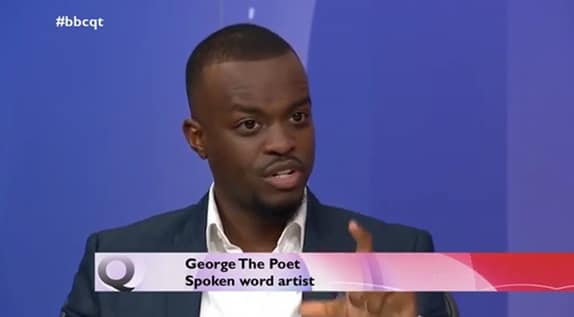


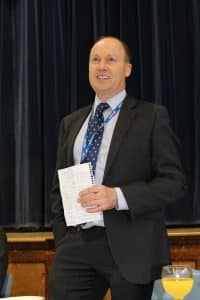
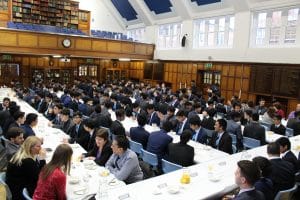 The luncheon followed a format of a three-course meal, with Friends of Queen Elizabeth’s volunteers assisting the School’s catering team. This was followed by toasts and speeches. School Captain Aashish Khimasia presided over the occasion as master of ceremonies, leading the toasts to The Queen and the ‘loyal toast’ to Queen Elizabeth I; as is customary, this was taken in silence. One of the Senior Vice-Captains, Aditya Ravindrakumar, introduced Mr Parker, with Vice-Captain Parth Gosalia delivering the vote of thanks at the conclusion of the event.
The luncheon followed a format of a three-course meal, with Friends of Queen Elizabeth’s volunteers assisting the School’s catering team. This was followed by toasts and speeches. School Captain Aashish Khimasia presided over the occasion as master of ceremonies, leading the toasts to The Queen and the ‘loyal toast’ to Queen Elizabeth I; as is customary, this was taken in silence. One of the Senior Vice-Captains, Aditya Ravindrakumar, introduced Mr Parker, with Vice-Captain Parth Gosalia delivering the vote of thanks at the conclusion of the event.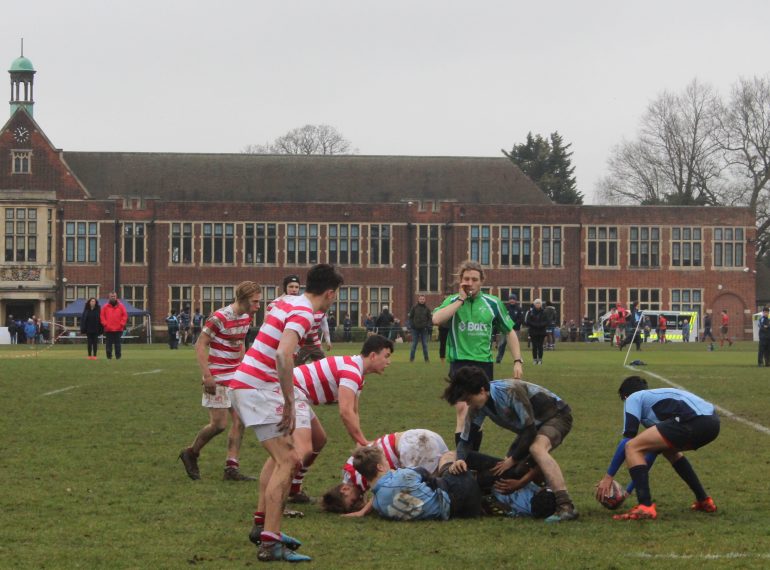
 Organiser James Clarke, PE & Games teacher at QE, said: “There was a very high level of rugby. Conditions were tricky, with muddy pitches, but the rain largely held off throughout most of the day.” He was assisted by a team including former senior Games staff Mark Peplow and Dave Maughan, who returned to QE lend their support.
Organiser James Clarke, PE & Games teacher at QE, said: “There was a very high level of rugby. Conditions were tricky, with muddy pitches, but the rain largely held off throughout most of the day.” He was assisted by a team including former senior Games staff Mark Peplow and Dave Maughan, who returned to QE lend their support. Richard Scally, also of the PE & Games department said: “Our U16s had an exciting opening match against Gunnersbury from Brentford, although a second-half resurgence was not quite enough to overturn the deficit from the first half. They then had to play the eventual winners, Tonbridge, before putting in a controlled display to beat The King’s School, Gloucester, 12-0, with a brace of tries from Year 10’s Jeff Hagan.
Richard Scally, also of the PE & Games department said: “Our U16s had an exciting opening match against Gunnersbury from Brentford, although a second-half resurgence was not quite enough to overturn the deficit from the first half. They then had to play the eventual winners, Tonbridge, before putting in a controlled display to beat The King’s School, Gloucester, 12-0, with a brace of tries from Year 10’s Jeff Hagan. QE’s U14s began with defeat to Wimbledon College and were awarded a 25-0 walk-over win against absent Colfe’s School [from south-east London], before drawing 12-12 with Gunnersbury.
QE’s U14s began with defeat to Wimbledon College and were awarded a 25-0 walk-over win against absent Colfe’s School [from south-east London], before drawing 12-12 with Gunnersbury.

 In addition to the comprehensive range of prizes for academic subjects, there were also many awards for boys who have excelled in extra-curricular fields such as sports, chess, the Combined Cadet Force and drama, as well as for those who have given outstanding commitment and service to the School and to society.
In addition to the comprehensive range of prizes for academic subjects, there were also many awards for boys who have excelled in extra-curricular fields such as sports, chess, the Combined Cadet Force and drama, as well as for those who have given outstanding commitment and service to the School and to society. At Trinity, she studied History, against the wishes of her mother who would have rather she had read Law. She advised boys to study what interests them, what they love and enjoy, because “work will then not feel like work”. She had been advised by her boss in the late 1990s to give up on researching about terrorism – it was “too niche”, he advised. Then, following the events of September 11, 2001, suddenly everyone was interested in her work and in the field. She was fortunate that what she loved researching was what people wanted to know about, but she would still have been happy even if it had not gained such widespread attention as an issue, she told the audience.
At Trinity, she studied History, against the wishes of her mother who would have rather she had read Law. She advised boys to study what interests them, what they love and enjoy, because “work will then not feel like work”. She had been advised by her boss in the late 1990s to give up on researching about terrorism – it was “too niche”, he advised. Then, following the events of September 11, 2001, suddenly everyone was interested in her work and in the field. She was fortunate that what she loved researching was what people wanted to know about, but she would still have been happy even if it had not gained such widespread attention as an issue, she told the audience. The Mayor spoke of his pride both in the education on offer in Barnet and at the diversity of the borough’s population, one of the most ethnically and religiously diverse places in the country. He reminded boys to enjoy their time at school and the opportunities it afforded them. Cllr Salinger announced that the completion of his mayoral year in May would be the end of his 36 years as a councillor.
The Mayor spoke of his pride both in the education on offer in Barnet and at the diversity of the borough’s population, one of the most ethnically and religiously diverse places in the country. He reminded boys to enjoy their time at school and the opportunities it afforded them. Cllr Salinger announced that the completion of his mayoral year in May would be the end of his 36 years as a councillor. Director of Music Cheryl Horne directed a 13-strong ensemble who began and ended the formal part of the evening with a Processional and a Recessional of her own composition. In addition, the ceremony was punctuated by musical interludes performed by boys from the senior years. Year 10’s Joshua Wong and Reza Sair performed Largo ma non tanto from J S Bach’s Double Violin Concerto in D Minor. From Year 11, clarinettist Bhiramah Rammanohar played the Allegro amabile from Brahm’s Sonata in E flat. Year 13’s Joshua Wong and Tai Oyama, of Year 11, gave their rendition of Shostakovich’s Prelude for Two Cellos after the presentation of the Sixth Form awards.
Director of Music Cheryl Horne directed a 13-strong ensemble who began and ended the formal part of the evening with a Processional and a Recessional of her own composition. In addition, the ceremony was punctuated by musical interludes performed by boys from the senior years. Year 10’s Joshua Wong and Reza Sair performed Largo ma non tanto from J S Bach’s Double Violin Concerto in D Minor. From Year 11, clarinettist Bhiramah Rammanohar played the Allegro amabile from Brahm’s Sonata in E flat. Year 13’s Joshua Wong and Tai Oyama, of Year 11, gave their rendition of Shostakovich’s Prelude for Two Cellos after the presentation of the Sixth Form awards.